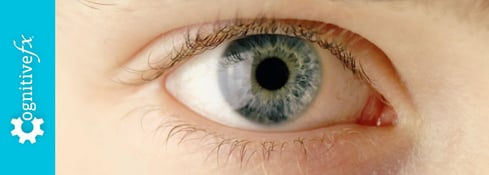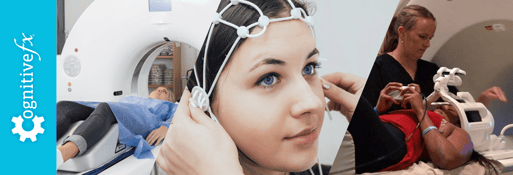Post-Concussion Syndrome Leg Weakness: Causes and Treatment
Leg weakness after a concussion can significantly impact mobility and daily life. Patients may feel their legs are untrustworthy, worry about falling, or contend with stiffness and fatigue.
Published peer-reviewed research shows that Cognitive FX treatment leads to meaningful symptom reduction in post-concussion symptoms for 77% of study participants. Cognitive FX is the only PCS clinic with third-party validated treatment outcomes.
READ FULL STUDY
Answer a few questions to evaluate your symptoms and get personalized guidance on next steps.
This quiz is not a medical diagnosis. It is designed to help you understand your symptoms and determine appropriate next steps. Always consult a qualified healthcare provider for medical advice. If you are experiencing a medical emergency, call 911 immediately.
Who is this assessment for?
We'll tailor the questions based on your answer.
How old are you?
Age affects how concussion symptoms present and what recovery looks like.
Is the person experiencing any of the following right now? Select all that apply.
How did the injury occur?
The mechanism of injury helps assess severity.
How long ago did the injury happen?
This helps us understand where in the recovery process things stand.
At the time of injury, did any of the following happen?
Select all that apply.
How have the symptoms been changing over time?
This tells us a lot about the recovery pattern.
Rate each symptom currently being experienced
0 = not present, 6 = most severe. Tap the number that matches.
Tell us more about the headaches
If no headaches, select "No headaches" and continue.
Tell us about any dizziness or balance issues
Select all that apply. If none, select "No dizziness or balance issues."
How does physical activity affect the symptoms?
Exercise tolerance is one of the most important clinical indicators.
How long can you look at a screen before symptoms worsen?
Phones, computers, tablets, TV all count.
How has sleep been affected?
Select all that apply.
Have you noticed any emotional or cognitive changes?
Select all that apply.
What tends to make the symptoms worse?
Select all that apply.
Medical history and daily impact
Last set of questions. This helps us personalize your results.
How many concussions or head injuries have you had (including this one)?
Pre-existing conditions (select all that apply)
How much are symptoms affecting daily life?
Have you received any treatment for these symptoms?
Based on your responses, the symptoms described may indicate a serious condition that requires urgent medical evaluation.
The symptoms you selected can indicate bleeding or swelling in the brain that needs immediate treatment. Do not wait to see if symptoms improve on their own.
This free concussion assessment is based on validated clinical tools used by medical professionals, including the Post-Concussion Symptom Scale (PCSS), the Sport Concussion Assessment Tool 6 (SCAT6), and the Rivermead Post-Concussion Symptoms Questionnaire (RPQ). The quiz evaluates symptoms across seven clinical domains: cognitive, physical, vestibular, visual, emotional, sleep-related, and autonomic.
Your answers are scored using a weighted algorithm that accounts for symptom severity, injury timeline, medical history, exercise tolerance, screen tolerance, and risk factors such as prior concussions, age, and pre-existing conditions. Based on your composite score, the quiz routes you to one of four outcome tiers: emergency care, acute medical evaluation, post-concussion syndrome evaluation, or monitoring with self-care guidance.
Concussions can present with a wide range of symptoms that vary by person, age, and injury severity. The most common symptoms include headache (reported by 80 to 90 percent of concussion patients), dizziness, mental fog, difficulty concentrating, memory problems, fatigue, sensitivity to light and noise, balance difficulties, vision changes, sleep disruption, nausea, and emotional changes such as increased irritability or anxiety.
In children under 12, concussion symptoms often look different than in adults. Behavioral changes, excessive crying, clinginess, loss of interest in favorite activities, and academic difficulties may be the primary indicators. Fewer than 10 percent of concussions in children involve loss of consciousness, so the absence of a blackout does not rule out a concussion.
For older adults over 65, falls are the leading cause of concussion. The risk of complications is higher due to brain atrophy and the common use of blood-thinning medications, which increase the chance of intracranial bleeding even after seemingly minor impacts.
While most concussions resolve within 10 to 14 days, about 15 to 30 percent of patients develop post-concussion syndrome (PCS), where symptoms persist for months or even years. PCS is diagnosed when concussion symptoms continue beyond the expected recovery window, typically three months or longer after the initial injury.
Research shows that among PCS patients who eventually recover, 67 percent improve within one year, 20 percent between one and two years, and 3 percent between two and three years. Without specialized intervention, recovery after three years is extremely unlikely. The average symptom duration among patients who have not recovered is 4.5 years.
Persistent symptoms occur because of disrupted neurovascular coupling, where brain regions fail to receive appropriate blood flow for the level of activity being demanded. This dysfunction does not appear on standard CT or MRI scans because the problem is functional rather than structural. Functional brain imaging, such as functional MRI (fNCI), can identify the specific areas and pathways affected.
Call 911 or go to the nearest emergency room immediately if any of the following symptoms are present: a worsening headache that does not improve, repeated vomiting (two or more episodes), seizures or convulsions, one pupil larger than the other, loss of consciousness or inability to be awakened, increasing confusion, slurred speech, weakness or numbness in the arms or legs, or clear fluid draining from the nose or ears.
For children, additional warning signs include inconsolable crying, refusal to eat or nurse, and inability to be consoled. A dangerous combination to watch for is a worsening headache paired with repeated vomiting and increasing drowsiness, which may indicate rising intracranial pressure.
The 2022 Amsterdam Consensus Statement, based on systematic reviews of over 78,000 citations, identifies controlled aerobic exercise as the first recommended treatment for persistent post-concussion symptoms. Sub-threshold aerobic exercise initiated within two to ten days after injury has been shown to reduce the risk of persistent symptoms by up to 48 percent.
For patients with established post-concussion syndrome, treatment typically involves a multidisciplinary approach that may include vestibular rehabilitation for balance and dizziness, vision therapy for ocular-motor dysfunction, cognitive rehabilitation for attention and memory deficits, and cognitive behavioral therapy for emotional symptoms. The strongest clinical evidence supports integrated programs that address multiple symptom domains simultaneously rather than treating each symptom in isolation.
Cognitive FX uses functional brain imaging to identify the specific brain regions and networks affected by concussion, then delivers a personalized intensive treatment protocol (EPIC Treatment) that targets those areas directly. A peer-reviewed study showed 77 percent of patients experienced substantial symptom relief, with improvement occurring regardless of how many concussions a patient had sustained or how long symptoms had been present.
Note: While this quiz will give you some insight into your current conditions, your results are only as good as your answers. It is not a substitute for seeing a doctor and is not official medical advice. If you’re experiencing any of the signs of severe traumatic brain injury (TBI), seek medical attention immediately. Otherwise, feel free to use this quiz as a starting point to determine if you need further care. Also note that, while we may record your responses, it is not linked with any personally-identifying information.
Your quiz results provide a starting point, not a final answer. What you do next depends on how recently the injury happened and how severe your symptoms are.
If your results suggest an emergency, call 911 or go to the nearest emergency room immediately. Do not wait.
If your results suggest a recent concussion (within the last two weeks), see a healthcare provider within 24 to 48 hours. Bring a list of your symptoms and note when they started, what makes them better, and what makes them worse. In the meantime, get plenty of sleep, stay hydrated, and avoid strenuous physical or cognitive activity until you have been evaluated.
If your results point toward post-concussion syndrome, your symptoms have lasted longer than the normal recovery window and are unlikely to resolve with rest alone. At this stage, professional evaluation by a concussion specialist is the most productive next step. Standard CT and MRI scans typically appear normal in these cases because the underlying issue is a functional disruption in how the brain regulates blood flow, not a structural injury that shows up on imaging.
If your symptoms are minimal, keep monitoring over the next one to two weeks. Most concussions resolve within 10 to 14 days with a gradual return to normal activity. If symptoms worsen or new symptoms appear, see a doctor. You can read more about what to expect during concussion recovery in our treatment guide.
You can screen for concussion symptoms at home using a self-assessment like the quiz above, but you cannot diagnose a concussion on your own. A concussion is a clinical diagnosis, meaning a qualified healthcare provider needs to evaluate you in person. There is no single test that definitively confirms or rules out a concussion.
What you can do at home is track your symptoms carefully. Pay attention to headaches, dizziness, difficulty concentrating, memory problems, sensitivity to light or noise, balance issues, and changes in sleep or mood. Document the severity of each symptom on a scale of 0 to 6 and note whether they are improving, staying the same, or getting worse over time. This information is extremely valuable when you see a doctor.
Our quiz uses the same symptom rating approach found in the Post-Concussion Symptom Scale (PCSS), the most widely used concussion symptom inventory in clinical practice. It also incorporates elements from the SCAT6 (Sport Concussion Assessment Tool) and the Rivermead Post-Concussion Symptoms Questionnaire (RPQ). These are the same instruments used by team physicians in the NFL, NHL, and at the Olympics.
Concussion symptoms can show up immediately or take hours (sometimes days) to appear. They generally fall into a few categories:
Physical symptoms are typically the first to appear and include headache (the most common symptom, reported by roughly 80 to 90 percent of concussion patients), dizziness, nausea, sensitivity to light and noise, balance problems, fatigue, blurred vision, and neck pain.
Cognitive symptoms involve difficulty concentrating, memory problems, feeling mentally foggy or slowed down, and trouble finding the right words in conversation.
Emotional symptoms can include increased irritability, anxiety, sadness, mood swings, feeling overwhelmed by situations that used to be manageable, and personality changes that others notice.
Sleep-related symptoms range from difficulty falling or staying asleep to sleeping much more than usual and not feeling rested even after a full night.
A common misconception is that you have to lose consciousness to have a concussion. In reality, fewer than 10 percent of concussions involve blacking out. Feeling dazed, confused, or "not right" for even a few seconds after a hit to the head (or a whiplash-type force to the body) is enough to indicate a concussion.
For a deeper look at how to recognize concussion symptoms, see our full guide on how to know if you have a concussion.
Children and teenagers often display concussion symptoms differently than adults, which is one reason our quiz adapts its questions based on age.
In children under 12, look for behavioral changes rather than verbal complaints. Young children may become unusually irritable, clingy, or tearful. They may lose interest in toys or activities they normally enjoy, have difficulty with balance or coordination, or regress in developmental milestones. Academic performance often drops. Because children rarely lose consciousness after a concussion, parents should not assume the absence of a blackout means there was no injury.
In teenagers (ages 12 to 17), the biggest concern is second impact syndrome. This occurs when a second concussion happens before the first has fully healed, and it is almost always catastrophic. Adolescent brains are roughly 60 times more sensitive to the metabolic disruption caused by concussion than adult brains. This vulnerability window lasts about 10 to 15 days after injury. For this reason, return to school (with academic accommodations) should always be completed before any return to sports.
In older adults (65 and over), falls are the leading cause of concussion. Brain atrophy that occurs with aging stretches the bridging veins inside the skull, increasing the risk of slow bleeding (chronic subdural hematoma) that can develop over weeks and mimic symptoms of dementia or stroke. Anyone over 65 taking blood-thinning medications should be evaluated by a doctor after any head impact, even if initial symptoms seem minor.
To learn more about concussion symptoms across all age groups, visit our comprehensive symptom guide.
Certain symptoms after a head injury indicate a medical emergency. If you or someone you are with experiences any of the following, call 911 or go to the nearest emergency room immediately:
For young children, also watch for inconsolable crying and refusal to eat or nurse.
A particularly dangerous pattern to recognize is a worsening headache combined with repeated vomiting and increasing drowsiness. This combination can indicate rising pressure inside the skull and requires immediate medical attention.
Most concussions heal within 10 to 14 days. But for roughly 15 to 30 percent of patients, symptoms persist for months or even years. When concussion symptoms continue beyond the expected recovery window (generally three months or longer), this is called post-concussion syndrome, or PCS.
PCS happens because the concussion disrupts the brain's ability to regulate blood flow to the regions that need it. This is called neurovascular coupling dysfunction. When you concentrate on a task, for example, the brain regions responsible for that task need more blood flow. After a concussion, that signaling mechanism can break down. The result is that everyday activities like reading, working at a computer, driving, or holding a conversation become exhausting and symptom-provoking.
The frustrating part is that standard CT and MRI scans almost always come back "normal" in PCS patients, because the problem is functional, not structural. This leads many patients to hear some version of "your scans look fine, there is nothing wrong." Functional brain imaging, such as the fNCI (functional NeuroCognitive Imaging) scan used at our clinic, can identify exactly which brain regions are under- or over-performing, making targeted treatment possible.
Among PCS patients who eventually recover, research shows 67 percent improve within one year, 20 percent between one and two years, and 3 percent between two and three years. The critical finding: patients who have not recovered after three years without intervention are unlikely to recover spontaneously. The average symptom duration among non-recovered patients is 4.5 years.
For a thorough overview of PCS, how it develops, and treatment options, read our guide on post-concussion syndrome.
The 2022 Amsterdam Consensus Statement, the most comprehensive review of concussion science to date, identifies controlled aerobic exercise as the first recommended treatment for persistent symptoms. Research shows that sub-threshold aerobic exercise initiated within the first two to ten days after injury can reduce the risk of developing persistent symptoms by up to 48 percent.
For patients with established PCS, the strongest evidence supports multidisciplinary treatment programs that address multiple symptom domains at once rather than treating each symptom in isolation. Depending on the specific areas of dysfunction, effective treatments may include:
At Cognitive FX, we use fNCI brain imaging to identify exactly which brain regions and pathways have been affected by the concussion, then deliver a personalized intensive treatment protocol (EPIC Treatment) that targets those areas directly. A peer-reviewed study showed 77 percent of patients experienced substantial symptom relief, with improvement occurring regardless of how many concussions the patient had or how long symptoms had been present.
We treat over 1,000 brain injury patients per year and serve as the Official Second Opinion Provider for the NFL Players Association. If you have been struggling with symptoms that have not responded to other treatments, schedule a consultation to discuss whether our approach could help.
You can also learn more about exercising safely after a concussion and how to identify a quality concussion treatment clinic.
The most common signs are headache, dizziness, mental fog, difficulty concentrating, and sensitivity to light or noise following a hit to the head or a whiplash-type force. You do not need to lose consciousness to have a concussion. If you are experiencing symptoms after a head injury, take the free quiz above to evaluate their severity, and see a healthcare provider for a definitive diagnosis.
Most concussions do heal on their own within 10 to 14 days with adequate rest, hydration, and a gradual return to normal activities. However, 15 to 30 percent of patients develop persistent symptoms that require professional treatment. If symptoms have not improved after two to four weeks, see a concussion specialist.
For the majority of patients, symptoms resolve within two weeks. About 15 to 30 percent of patients experience symptoms lasting three months or longer (post-concussion syndrome). Among PCS patients, most recover within one year, but without treatment, some experience symptoms for many years.
This quiz is based on the same validated clinical instruments (PCSS, SCAT6, RPQ) used by healthcare professionals, including team physicians in the NFL and NHL. It provides a reliable self-assessment of symptom severity and risk factors, but it is not a medical diagnosis. A qualified healthcare provider should evaluate you in person for a definitive answer.
No. Your results are calculated and displayed instantly at no cost. We do not require an email address, sign-up, or registration of any kind.
Go to the emergency room immediately if you experience a worsening headache, repeated vomiting, seizures, unequal pupils, loss of consciousness, increasing confusion, slurred speech, limb weakness or numbness, or clear fluid from the nose or ears. These symptoms can indicate bleeding or swelling in the brain.
A history of multiple concussions increases the risk of prolonged symptoms and more difficult recovery. Each subsequent concussion makes the brain more vulnerable. If you have had two or more concussions and are experiencing persistent symptoms, specialized evaluation with functional brain imaging is recommended to identify the specific areas of dysfunction.
If it’s been three months since your injury and you’re still hurting from post-concussion symptoms, we can help. Contact us for a consultation to learn more about your options.

Alina Fong, Ph.D. is a clinical neuropsychologist and the Clinical Director and Co-Founder of Cognitive FX. She earned her Ph.D. in Clinical Neuropsychology with an emphasis in Neuroimaging from Brigham Young University, where she received the American Psychological Association Division 40 Graduate Student Research Award for her neuroimaging research. Dr. Fong has over 17 years of clinical experience treating traumatic brain injury, beginning with her work at the VA Salt Lake City Healthcare System and Utah Valley Regional Medical Center, where she directed the neurotrauma rehabilitation and sports concussion clinics. She developed the EPIC Treatment protocol and has personally overseen treatment for nearly 8,000 brain injury patients, including professional athletes from the NFL, NHL, and Olympics. She serves as Vice President of the Brain Injury Alliance of Utah, sits on the board of the United States Brain Injury Alliance, and advises PINK Concussions. Dr. Fong has authored peer-reviewed research on functional MRI and concussion treatment and has presented at over 60 medical conferences, including the Federal Interagency Conference on TBI and the American Medical Society for Sports Medicine.

Leg weakness after a concussion can significantly impact mobility and daily life. Patients may feel their legs are untrustworthy, worry about falling, or contend with stiffness and fatigue.

If you’ve suffered a concussion, you may have already encountered the Post-Concussion Symptom Scale (PCSS). This self-report questionnaire is one of the most widely used tools for documenting...

Eye twitching is typically mild and short-lived, but for some patients with post-concussion syndrome (PCS), it can become a persistent and uncomfortable symptom. While often overlooked, eye twitching...

After suffering a mild traumatic brain injury, you might expect to feel off for a few days before being able to function at your normal level again. However, a rapid return to normal is not the case...

If you’re searching for answers and think you might have post-concussion syndrome (PCS), the path to diagnosis can be challenging. Few medical professionals are experts on the condition, and many...

There is no exact time frame for recovering from a mild traumatic brain injury (mTBI), otherwise known as a concussion. The majority of people who sustain an acute concussion recover within a few...
Published peer-reviewed research shows that Cognitive FX treatment leads to meaningful symptom reduction in post-concussion symptoms for 77% of study participants. Cognitive FX is the only PCS clinic with third-party validated treatment outcomes.
READ FULL STUDY